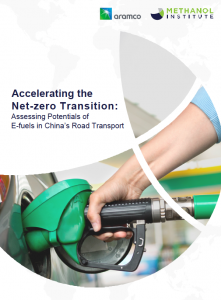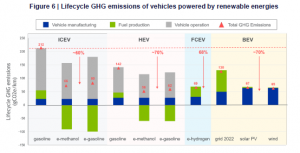Methanol Institute and Aramco Release Report on the Potential of Low-Carbon E-Fuels in China
Study makes the case for e-fuels (e-hydrogen, e-methanol and e-gasoline to accelerate the transition for China’s road transport sector.
The technology for e-methanol and e-gasoline is mature, offering environmental and economic benefits for China’s road transport sector that rival battery electric and hydrogen fuel cell vehicles”
BEIJING, CHINA, May 20, 2024 /EINPresswire.com/ -- The Methanol Institute and Aramco are pleased to announce their joint report, showcasing the decarbonization potential of low-carbon e-fuels in China’s road transport sector and supported by member companies including Geely Holding Group and OCI Global. — Greg Dolan, CEO Methanol Institute
This 3E (environment, economy and efficiency) study makes the case for e-fuels (e-hydrogen, e-methanol and e-gasoline via methanol to gasoline (MTG) technology) to accelerate the transition for China’s road transport sector. The authors demonstrate that e-fuels applications in advanced powertrains such as hydrogen fuel cell electric vehicles, M100 and gasoline hybrid vehicles) could achieve lifecycle GHG emissions as low as battery electric vehicles fully charged with renewable electricity.
“The technology for e-methanol and e-gasoline is mature and rapidly advancing, offering environmental and economic benefits for China’s road transport sector that rival battery electric and hydrogen fuel cell vehicles,” said Methanol Institute CEO Gregory Dolan. “We sincerely believe that low-carbon e-fuels will play an even bigger role in the energy transition for China and rest of world, and encourage policy makers to consider this fast changing trend.“
Another study recently released by the Methanol Institute, found that global renewable methanol capacity could reach 19.7 MMTs by 2029, with more than half of the announced capacity targeting e-methanol production. China is taking a leading role hosting two thirds of near-term global renewable methanol production.
While the current production cost of e-fuels are approximately 2-3 times more than that of their fossil-based counterparts, China envisions overcoming this barrier – namely, scale and cost competitiveness by leveraging its abundant renewable resources, advanced manufacturing capabilities, and its mature energy and chemical value chains. Anticipated advancements suggest a potential halving of e-fuels production costs by 2030 – making the cost of e-methanol, for example, only 30% higher than China’s coal-based methanol. The confluence of electrified powertrains and e-fuels positions China on an accelerated trajectory toward sustainable, low-carbon mobility.
About the Methanol Institute
The Methanol Institute (MI) serves as the trade association for the global methanol industry, representing the world’s leading producers, distributors, shippers, and technology companies. MI now represents its members from five offices around the world in Singapore, Washington DC, Beijing, Brussels, and Delhi.
The report is available to download free of charge on MI's website HERE.
Mr. Kai Zhao
Methanol Institute
+1 703-618-2224
email us here
Legal Disclaimer:
EIN Presswire provides this news content "as is" without warranty of any kind. We do not accept any responsibility or liability for the accuracy, content, images, videos, licenses, completeness, legality, or reliability of the information contained in this article. If you have any complaints or copyright issues related to this article, kindly contact the author above.



